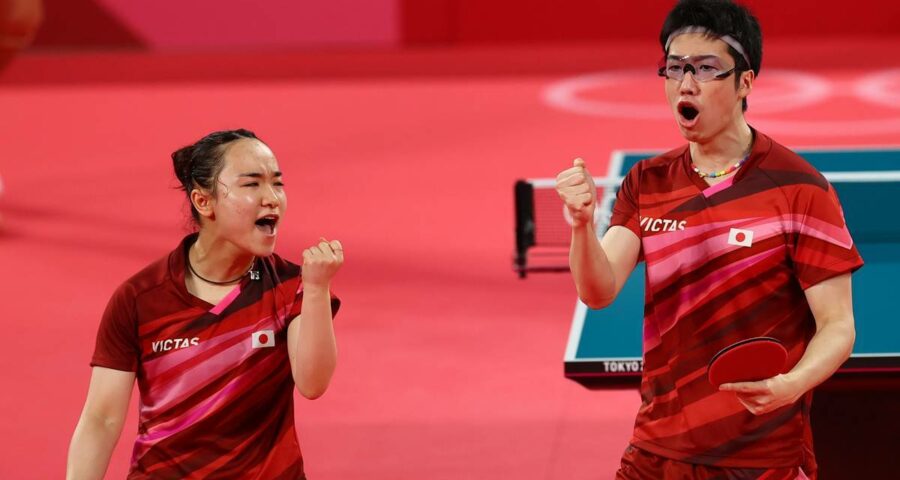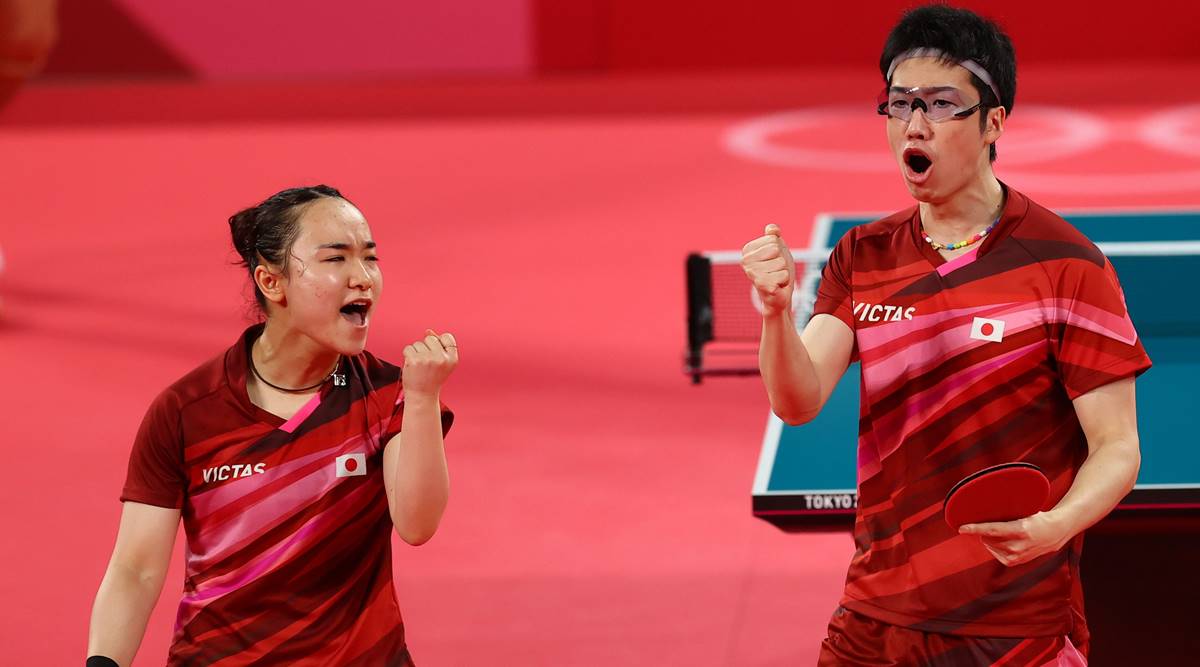Contests between the two countries in badminton and table tennis set to heat up
The iconic din-making inflated clappers, a staple of Asian sporting arenas, are missing, without the crowds.
But Asia’s most cutting rivalry between hosts Japan and China, expected to top the table, is as alive as ever. True to their cultures, sporting contests between the two powerhouses in racquet sports, TT and badminton, do not need boisterous full houses. The silent menace of matching pure sporting wits, sits heavy at the Musashino Forest arena and the Metropolitan, venues for shuttle and TT.
Surprisingly, Round 1 of this racquet tango, went to Japan.
On Monday the Chinese were their usual dominant self, as their former World No 1s Xu Xin and Liu Shiwen – currently the men’s World No 2 and women’s World No 7 respectively – raced to a 2-0 lead in the mixed doubles final against Japan’s 31-year-old Mizutani and 20-year-old Mima Ito, the current World No 2. The home-team shoulders had started to droop at that point, till something clicked and they launched an irresistible comeback.
From being down 2-0, they stormed back to take a 3-2 lead. The Chinese levelled up again, but in the deciding game, the Japanese raced to an 8-0 lead.
As the camera zoomed into Ito’s face, there was no mistaking the grin she had on, even when she was about to receive serve. Eventually they went on to win the match 4-3, 11-6 in the final game. The win made this the first time since Athens 2004 where China failed to make a clean sweep of all the gold medals on offer in table tennis.
Japan hoped it was the first of many reversals they could effect in what has been China’s domineering ‘stranglegold’ – a near monopoly of the podium. This includes 13 of the 16 men’s events. And 28 of 32 contested medals in TT.
For years Japan has been the country with the highest ranked players in world table tennis outside China. It’s one of the reasons why talented Japanese players like Jun Mizutani has never reached the World No. 1 spot.
Japanese TT head coach Kurashima Yosuke had told Olympics.com how they needed to “enhance the quality of each stroke if we have to beat China someday.” While Rio saw the first breakthrough for Japan – a men’s team silver and Mizutani’s bronze in men’s singles, Japan had announced its intent to fight tooth and nail for every TT gold that China usually saunters to. While the debuting mixed title might seem like a harbinger of further reverses in the coming few days, there is no doubt that the two Asian superpowers will ensure that the Olympics buzz goes beyond track & field, swimming and gymnastics and right to the heart of the racquet sports culture that’s intrinsic and emotive to both nations.
Japan has frontlined its two former men’s Youth Olympic TT champs, Harimoto Tomokazu (from 2018) and Niwa Koki (2010), to get the job done.
But coach Kurashima relied on the mixed pairing’s rapport since both Mima / Mizuta come from the Shizouka Prefecture. China’s Olympic selections can be quite extreme : in 2012, their legend Ma Long was dropped from men’s singles, paying the price for losing to Koki at a previous Asian qualifier in a semifinal.
This ruthlessness isn’t limited to China. Or TT. Badminton sees its own scything.
Akane Yamaguchi, the women’s singles shuttler copped a tirade of criticism when she went down in three sets to China’s Chen Yufei in the Sudirman Cup finals. Her meltdown from being a set up, to a harrowing loss, has defined her as a player with suspect nerves ever since that 2019 final.
It’s the sort of face-offs that lead to grudges being nursed and games and mental frameworks being overhauled in either camps.
The same script runs through all the five categories, but it is the first time that Japan has the personnel to enforce a clean sweep — something Chinese badminton routinely aimed for, even if Rio was a disaster.
While China finished with just two gold (in men) at Rio and have 41 medals in all, Japan has only 3 from the last two Games.
At Tokyo though, in Kento Momota and their commanding doubles pairings, Japan are hoping to stake claim at every gold there is. What makes this enticing is, China smarting from their Rio misses are tipped to come out all guns blazing, and have prepared through the pandemic with simulations, including calculating the time taken by bus from Games village to venue in their recreations.
With both countries battling hard for the top prizes, badminton will carry a cutthroat edge to these face-offs. Racquet sports will feel right at home at Tokyo, where Asia’s bitterest rivalry plays out.
Source: Read Full Article


